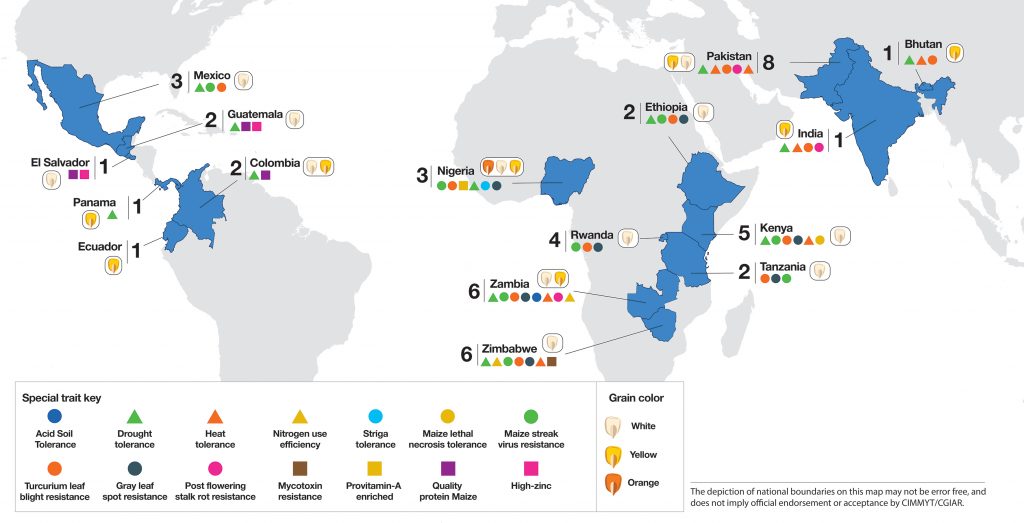
Maize Annual Report 2020
The CGIAR Research Program on Maize (MAIZE) is proud to release our 2020 Annual Report.
In 2020, faced with the extraordinary challenges posed by the COVID-19 pandemic, the CGIAR Research Program on Maize (MAIZE) continued its mission to strengthen maize-based agri-food systems while improving the food security and livelihoods of the most vulnerable, especially resource-constrained smallholder farmers and their families.
MAIZE made great advances in the development of improved stress-tolerant maize varieties with enhanced genetic gain. In 2020, national partners and seed companies across Africa, Latin America and Asia released 48 unique CGIAR-derived maize varieties. In addition to high yield, these elite varieties are stacked with multiple traits needed by smallholder farmers to protect their crops from drought, heat and diseases. These MAIZE varieties also included 11 nutritionally enriched varieties with improved protein quality, provitamin A and high kernel zinc.

MAIZE and its partners also made significant strides in combatting fall armyworm in Africa and Asia on several fronts, including intensive research on the most effective control strategies. In addition to promoting integrated pest management (IPM) packages tailored to diverse contexts in Africa and Asia, MAIZE announced three first-generation fall armyworm-tolerant maize hybrids in December 2020. This sets the stage for their varietal release, seed scale-up and commercialization.
MAIZE continued testing and promoting conservation agriculture and scale-appropriate mechanization, as part of sustainable intensification efforts in maize-based cropping systems in sub-Saharan Africa, South Asia and Latin America.
In 2020, MAIZE and its partners also made great advances in understanding how social norms and gender stereotypes inhibit women’s equality and progress in agriculture, and how women are challenging these power dynamics to access improved maize varieties and expand their influence on decision-making in maize-based agri-food systems.
MAIZE will come to a close at the end of December 2021. Yet much work remains to be done to strengthen food security, climate resilience, livelihoods and nutritional well-being in maize-based agri-food systems. The new CGIAR initiatives, especially those under Genetic Innovations and Resilient Agri-food Systems, will undoubtedly carry forward the MAIZE’s legacy of innovative agricultural R4D and strong partnership networks as well as the impactful breeding, seed systems, sustainable intensification work being done by MAIZE in Africa, Asia and Latin America.
Over the years, MAIZE has demonstrated the enormous value of deploying impactful varieties in our target regions and of incentivizing farmers to replace these varieties more frequently in order protect genetic gains and to stay ahead of emerging pests and diseases. Moving forward, we must continue to strengthen maize value chains in low- and middle-income countries and to improve the livelihoods of smallholders. We must firmly keep in view the gender and social inclusion dimensions of all our work. And we must continue to emphasize inclusive stakeholder participation and the empowerment of local institutions as foundational to successful and equitable agricultural R4D efforts.
The work presented in this report was possible through the generous and continued support from our funders, particularly through CGIAR Window 1 and 2 funding as well as several Window 3/bilateral projects. MAIZE receives W1&W2 support from the governments of Australia, Belgium, Canada, China, France, India, Japan, Korea, Mexico, Netherlands, New Zealand, Norway, Sweden, Switzerland, United Kingdom (FCDO), United States (USAID) and from the World Bank.
We would like to extend our sincere thanks to all the MAIZE partners, funders and stakeholders for their active engagement, hard work and support, especially during these challenging times. We hope you enjoy this year’s Annual Report as we look back upon our outcomes and achievements in 2020. MAIZE continues its deepest commitment to work together with our partners towards a more food secure future for all.
B.M. Prasanna
Director, CGIAR Research Program on Maize (MAIZE)
Read the full 2020 Maize Annual Report here.
annual report, Climate-resilient crops, conservation agriculture, fall armyworm, gender

